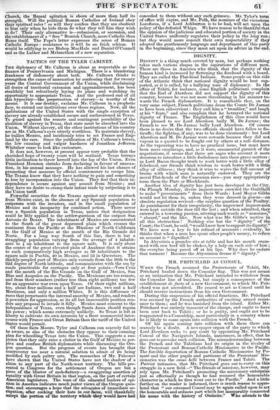TACTICS OF THE TYLER CABINET.
THE diplomacy of Mr. Calhoun is about as respectable as the finance of Pennsylvania and Michigan. There is a blundering frankness of dishonesty about both. Mr. Calhoun thinks to strengthen the cause of annexation by confessing that for twenty years:.the Central Government of the Union, while disclaiming all desire of territorial extension and aggrandizement, has been stealthily but relentlessly laying its plans and watching its opportunity to appropriate Texas. And the professed end of all this hypocrisy—the perpetuation of slavery—is worthy of the means. It is our destiny, exclaims Mr. Calhoun in a prophetic to extend our institutions over those regions. Now, all the institutions of the United States with the single exception of slavery are already established secure and unthreatened in Texas. To guard against the remote and contingent possibility of the abolition of slavery in Texas, that state must be absorbed into the Union. Without slavery, all the other institutions of his country are in Mr. Calhoun's eyes utterly worthless. To maintain slavery, he bullies Mexico, and insidiously tries to set France and Eng- land by the ears. Since the publication of Mr. Calhoun's letters, the low cunning and vulgar hardness of Jonathan Jefferson Whitelaw cease to look like caricature.
It does not, however, at present appear very probable that the cherished hope of twenty years will be realized. Texas betrays little inclination to throw herself into the lap of the Union. Even President Houston shrinks from declaring in favour of annexa- tion, in his annual message. He has allowed his last chance of promoting that measure by official countenance to escape him. The Texans know that they have nothing to gain and something lose by incorporation into the Union. They feel that their in- dependence is secure against any assault from Mexico ; and they have no desire to cramp their infant trade by subjecting it to the Union tariff.
Powerful securities for the Texans against any serious attack from Mexico exist, in the absence of any Spanish population to cooperate with the invaders, and in the small population of Mexico and its incapacity for combined action. There never was a Spanish population in Texas, unless that designation could- be fitly applied to the settler-garrison of the outpost San Antonio de Beier. The inhabitants of Mexico are concentrated to the South of the great depressed plain which crosses the continent from the Pacific at the Missions of North California to the Gulf of Mexico at the mouth of the Rio Grande del Norte. For a long way South of this line, there is but a straggling population varying from the average of 4 inhabit- ants to an inhabitant to the square mile. It is only about the centre of the great elevated plain of Anahuac that it attains to such comparatively high averages as 39 inhabitants to the square mile in Puebla, 40 in Mexico, and 52 in Queretaro. The thickly-peopled part of Mexico only extends from the 18th to the 22d degree of North latitude, and communicates with the sea by roads practicable for carriages only_ at four points—Vera Cruz and the mouth of the Rio Grande on the Gulf of Mexico, San Bias and Acapulco on the Pacific. The Mexicans are too remote, and from their numbers (rather less than eight millions) too few for an aggressive war even upon Texas. Of their eight millions, too, about four millions and a half are Indians, two and a half Mestizoes, and only a million Whites. It is this difference of races that perpetuates the internal anarchy of Mexico, and renders it powerless for aggression as its all but inaccessible position ren- ders any proposal to invade it folly. Mexico must consent to the independence of Texas, even though Santa Anna should regain his power ; which seems extremely unlikely So Texas is left at liberty to cultivate its own interests by a freer commercial inter- course with France and Great Britain than the tariff of the United States would permit. Of these facts Messrs. Tyler and Calhoun can scarcely fail to be aware, as also of the obstacles they oppose to their cunning plan for wheedling Texas into the Union. This suggests a sus- picion that they only raise a clatter in the Gulf of Mexico to per- plex and con.b.se British diplomatists while discussing the Ore- gon question. But the progress of events has brought that controversy too near a natural solution to admit of its being modified by such paltry arts. The researches of Mr. Falconer have shown that the United States have not the shadow of a claim to any part of the North-west territory. The bills pre- sented to Congress for the settlement of Oregon are but a piece of the bluster of mob-flattery—a swaggering assertion of equality with Great Britain in that region on the part of certain American legislators. The tone of the eauested leaders of opi- nion in America indicates much just,er views of the Oregon ques- tion, and encourages a hope that the advocates of immediate oc- cupation after cocking their hats in our faces, will thankfully , accept the portion of the territory which they would have had conceded to them without any such grimace. Mr. Tyler's term Of office will expire, and Mr. Polk, the nominee of the victorious Locofocos, if a Lord Ashburton is to be had, will act upon *8 policy of the defeated Whigs. We have reason to be thankful that the opinion of the judicious and educated portion of society in the United States nniformly regulates their policy in the long run ; but they would more consult their own respectability if they adopted the gentlemanly language and deportment of this party in the beginning, since they must act upon its advice in the end:


























 Previous page
Previous page